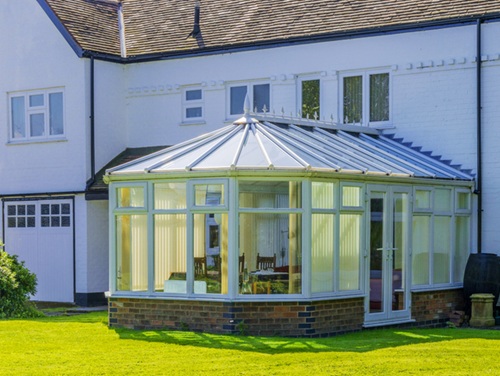How to Insulate a Conservatory
Reading time: 4 minutes
Why a conservatory should be insulated
While most rooms around UK properties are constructed using bricks and mortar, conservatories are usually built using glass and polycarbonate.
These materials make for poor insulators though, causing cold air to easily enter the structure and for heat to escape from them rapidly. A conservatory’s interior can also quickly get very warm when the sun is shining through the glass during a hot day.
Fortunately, the temperatures within this room can be levelled out by carrying out work to insulate a conservatory – making it a usable space of a property all year long.
Other reasons why this area of a property should be insulated include:
-
Insulation will help to improve the thermal performance of a conservatory, enhancing the space’s energy efficiency.
-
A well-insulated conservatory will mean less heating and cooling technology will need to be used, saving a property owner money on their energy bills.
-
The materials used to insulate a conservatory can reduce how much noise can be heard within the room from external sources.
-
The value of a property can be increased when it has a well-insulated conservatory in place.
Areas to consider when insulating a conservatory
If you have been sought out to insulate a conservatory, bear in mind that there are several ways to achieve this.
A structure’s roof can be fitted with conservatory insulation panels or foil insulation underneath the roofing that is already in place, for example. These methods will help to reduce heat loss during the winter months, as well as prevent the room from receiving too much heat gain in the summer.
You could also replace an entire conservatory roof with either a thick polycarbonate insulation design or a solid tiled roof.
The windows of a conservatory can be better insulated too, such as by fitting double glazing that will trap air between the two panes of glass and improve the thermal efficiency of the interior space.
Look to fit draught excluders around the window frames as well, as this technique can limit how much cold air can get inside a room, while blinds professionally placed on the ceiling windows can control how much sun shines into a conservatory.
The floor of a conservatory can also be better insulated by laying polystyrene or PIR boards, which have fantastic thermal benefits, directly onto a concrete slab.
Then there are the conservatory's walls to consider. Insulating plasterboard can improve the thermal efficiency of the internal section of the wall – this material has a smooth finish which makes it easy to paint or wallpaper onto too.
Cladding enhances thermal efficiency as well – this time applied to the external walls of a conservatory – not to mention being a decorative choice of material.
Do you need planning permission to insulate a conservatory?
Before you start any work on a conservatory, it is crucial that you check the legal requirements tied to the project.
It will not usually be the case that planning permission is needed to insulate a conservatory. This is because it will only be a requirement when significant alterations are made to the conservatory’s height, structure or overall footprint. It would be wise to check with your local authority first though, just to make sure you do not need planning permission.
However, you must always ensure the work complies with building regulations. This includes aspects related to electrical safety, fire safety regulations, ventilation, thermal performance and structural safety.
Fail to follow building regulations for a job and the entire conservatory’s structure could become compromised and at risk of damage over time.
Avoid these issues by making sure you read through our building regulations guide thoroughly and taking note of the requirements where they relate to your next project.
Stay on top of the latest developments and expert advice for keeping a property in the best possible condition by checking out many more of our comprehensive home maintenance guides.
Disclaimer: The information contained on this page is intended as an overall introduction and is not intended as specific advice from a qualified professional. Travis Perkins aims to avoid, but accepts no liability, in the case that any information stated is out of date.











